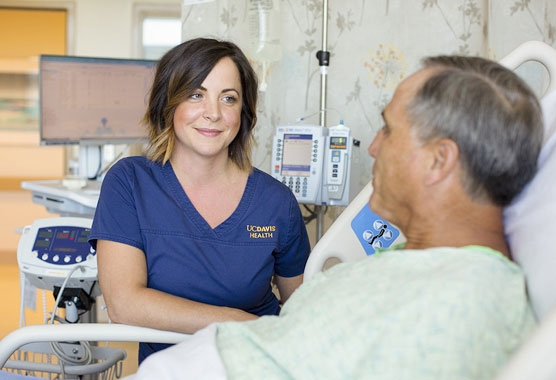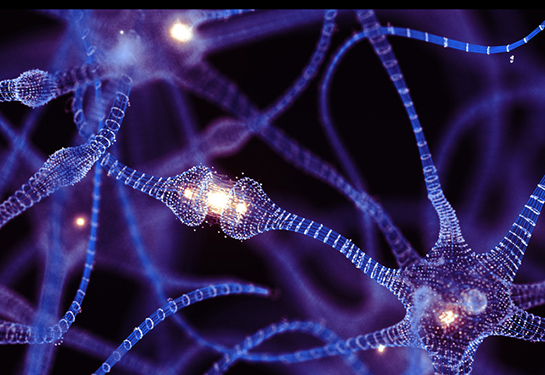Sarcoma
We offer expert, coordinated care for all types of sarcomas. Our goal is to protect your quality of life and long-term health.
Medically reviewed by Robert Canter, M.D. on Dec. 18, 2023.

Advanced Care for Soft Tissue Cancers
Cancer specialists (oncologists) at UC Davis Comprehensive Cancer Center provide advanced care for common and rare soft tissue cancers. We help children and adults with sarcomas lead full, active lives.
What Is Sarcoma?
Sarcomas are rare cancerous tumors that form in your bones or connective tissues. Adults and children can get sarcomas.
When sarcomas start in your bones, you have bone cancer. Osteosarcoma is the most common bone cancer.
Tumors that form in your connective tissue are called soft tissue sarcomas. These tumors may start in:
- Blood vessels
- Cartilage (joint linings)
- Fat cells
- Lymphatic vessels
- Muscles
- Nerves
- Tendons
There are more than 50 types of soft tissue sarcomas. Two of the most common — liposarcoma and undifferentiated pleomorphic sarcoma — often form in the soft tissue in the legs. Leiomyosarcoma tumors can arise in blood vessels or muscles throughout the body.
Sarcoma Symptoms
More than half of soft tissue sarcomas start in an arm or leg. But the tumors can form anywhere in your body. Symptoms vary depending on the tumor location.
Common Symptoms
Signs of soft tissue sarcomas include:
- Newly formed lump that may or may not cause pain
- Swelling of the abdomen that gets bigger slowly over time
- Worsening abdominal pain or back pain
Sarcoma Causes and Risk Factors
Changes to genes can cause healthy cells to become cancerous. These mutations allow diseased cells to grow out of control.
Some people inherit a gene change from a parent that increases their chances of developing soft tissue sarcomas. More commonly, a gene change occurs over time (an acquired mutation).
Most people who get soft tissue sarcomas have no known risk factors. The following factors may increase your risk:
Exposure to Chemicals
There may be a link between exposure to certain chemicals and sarcoma. These chemicals include vinyl chloride monomer (used in plastics), arsenic and certain herbicides.
History of Radiation Treatment
A small number of people who receive radiation therapy for a previous cancer go on to develop sarcomas at or near the radiated site.
Inherited Cancer Syndromes
People with gene changes that cause certain syndromes are more at risk. These inherited disorders include neurofibromatosis, Li-Fraumeni syndrome and retinoblastoma (a rare eye cancer).
Lymphedema
Surgery or radiation therapy for an earlier cancer can cause lymphedema, a buildup of lymph fluid. Angiosarcomas, a type of soft tissue sarcoma, can form in these swollen areas.
Diagnosis and Testing of Sarcoma
Experts at our Department of Radiology use advanced musculoskeletal imaging techniques to diagnose sarcomas that affect bones and soft tissues.
You may get one or more medical imaging tests, such as:
Looking at a sample of the tumor cells (a biopsy) under a microscope is the only way to know for sure if you have cancer or a noncancerous (benign) condition.
Your health care provider may use a needle to remove cells from the tumor. Or a biopsy may occur after your provider surgically removes the tumor.
Sarcoma Treatments
We’re a regional referral center for the treatment of soft tissue and bone sarcomas. Other centers send patients to us for our leading-edge treatments and high-quality patient care. We have sarcoma specialists for adults and children (pediatric oncologists).
You or your child benefit from a full range of sarcoma treatments at our cancer center.
Surgery
Surgery to remove the cancerous sarcoma tumor is the most common treatment. Our surgical oncologists remove the tumor with a rim of normal tissue around it to have a margin. This approach decreases the chance of the tumor coming back.
Radiation Therapy
This treatment uses energy beams to destroy cancer cells. You may get radiation therapy before surgery to shrink the tumor. After surgery, radiation therapy destroys lingering cancer cells. Some people get radiation therapy after surgery instead of before. In some cases, patients are treated with radiation to manage sarcoma when surgery isn’t an option.
Chemotherapy
Chemotherapy medications circulate in your blood to destroy cancer cells. You may receive chemotherapy before surgery to shrink a tumor. Some people get chemotherapy after surgery (with or without radiation therapy) to destroy lingering cancer cells.
Targeted Therapy and Immunotherapy
Targeted therapy drugs block proteins that allow cancer cells to grow and multiply. Immunotherapy drugs help your immune system find and destroy cancer cells.
"Soft Tissue Sarcomas and Subtypes," Sarcoma Alliance, https://sarcomaalliance.org/soft-tissue-sarcomas/
“What is sarcoma?" Sarcoma Alliance, https://sarcomaalliance.org/what-is-sarcoma/
Who does it affect?
13,400New soft tissue sarcoma cases occur in the U.S. each year
Soft tissue sarcomas cause
5,140Annual deaths in the U.S.
Osteosarcoma is most common in ages
10-30But people of any age can develop it
Source: American Cancer Society: Key Statistics for Soft Tissue Sarcomas
American Cancer Society: Key Statistics for Osteosarcoma
Request an Appointment
Our cancer specialists provide thorough evaluations and personalized treatment plans. Learn more about how to make an appointment at UC Davis Comprehensive Cancer Center.
Patients
New Patient Referral Office
916-734-5959
UC Davis Health Referring Physicians
For providers in UC Davis Medical Group or our Cancer Care Network
Physician Referral Center
916-734-5959
External Referring Physicians
For providers who are external clinicians
Referral Office
800-770-9261

Ranked among the nation’s best hospitals
A U.S. News & World Report best hospital in cardiology, heart & vascular surgery, diabetes & endocrinology, ENT, geriatrics, neurology & neurosurgery, and pulmonology & lung surgery.

Ranked among the nation’s best children’s hospitals
U.S. News & World Report ranked UC Davis Children’s Hospital among the best in pediatric nephrology, orthopedics*, and pulmonology & lung surgery. (*Together with Shriners Children’s Northern California)

Ranked Sacramento’s #1 hospital
Ranked Sacramento’s #1 hospital by U.S. News, and high-performing in aortic valve surgery, back surgery (spinal fusion), COPD, colon cancer surgery, diabetes, gynecological cancer surgery, heart arrhythmia, heart failure, kidney failure, leukemia, lymphoma & myeloma, lung cancer surgery, pacemaker implantation, pneumonia, prostate cancer surgery, stroke, TAVR, cancer, orthopedics, gastroenterology & GI surgery, and urology.

The nation’s highest nursing honor
UC Davis Medical Center has received Magnet® recognition, the nation’s highest honor for nursing excellence.

World-class cancer care
One of ~59 U.S. cancer centers designated “comprehensive” by the National Cancer Institute.

A leader in health care equality
For the 13th consecutive year, UC Davis Medical Center has been recognized as an LGBTQ+ Healthcare Equality Leader by the educational arm of America’s largest civil rights organization.

